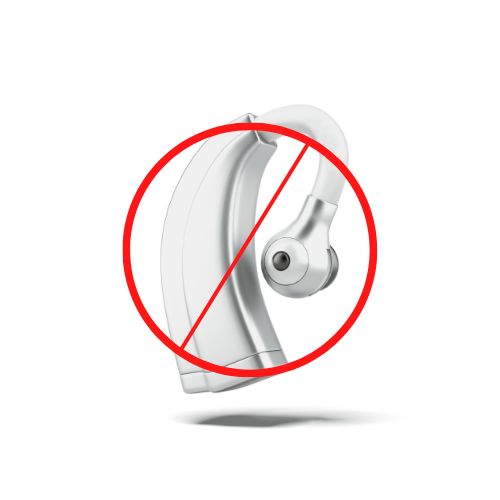Does Medicare Cover Hearing? This is one of the most common questions that we get from those folks turning 65.
The last thing on our minds as we get older is our hearing or even future ability to hear.
For most of us it has always been there and the thought of losing it can cause us to go into a deep depression.
What if I told you that figuring out what Medicare covers when it comes to hearing isn’t hard at all.
Today I will answer the question does Medicare cover hearing aids and also discuss things like hearing loss, ENT visits, and hearing tests.
Does Medicare Cover Hearing Aids?
Unfortunately, Original Medicare doesn’t cover hearing aids, hearing exams, or fittings for hearing aids.
If you don’t have coverage through another company, you could end up paying 100% of the cost for your regular hearing exams, fittings, and hearing aids.
If, however, you find yourself in a situation where getting treated for your hearing is medically necessary, then Part B of Original Medicare will cover you.
For instance, if you need to cover a diagnostic test due to a recent hearing loss that was caused by an illness or injury.
If this test is ordered you would pay the 20% co-pay of the amount approved by Medicare.
When it comes to obtaining services, always be sure to check that your doctor accepts Medicare and that they are participating in the program.
No matter the outcome of your hearing test results, Medicare will not cover the cost of the hearing aid.

Does Medicare Cover Audiologist?
Audiologists are health care professionals who specialize in disorders dealing with hearing, balance, and other neural systems. Once a disorder is diagnosed these healthcare providers fit and dispense hearing aids and other types of listening devices if appropriate. Keep in mind that an audiologist does not perform surgery. If you suffer from a hearing issue that requires surgery, then you will need to see an ENT doctor.
Types of Hearing Loss
Sensorineural hearing loss – which is when there is usually permanent damage to the inner ear or auditory nerve.
Conductive hearing loss – occurs when sound waves cannot reach the inner ear. Typically medical treatment or surgery can correct the hearing loss.
As we age, the odds of hearing loss increase. It is estimated that 1 in 3 people between the ages of 65 and 74 suffers from a certain degree of hearing loss. For those older than 75 nearly half has difficulty hearing clearly. This type of hearing loss is often times called Age-Related Hearing Loss but is medically diagnosed as Presbycusis. This type of hearing loss comes on gradually as we get older and it seems to run in families. Additionally this type of hearing loss usually (but not always) occurs in both ears. Once the hearing loss has progressed substantially, many older adults will look to hearing aids as a solution.
Will Medicare Cover Hearing Loss?
The only time your Medicare will cover anything related to your hearing is when it is considered medically necessary.
So, if you look at it that way, it will cover parts of dealing with an actual loss of audio.
If you will need surgery to correct this sound loss, or if your doctor determines that you need to get a referral to see a specialist.
No matter the outcome, or findings, Medicare will not cover the cost of a Hearing Aid.
What Does Medicare Cover?
So does this mean that a healthcare professional can refer you to an audiologist for a routine hearing test and Medicare will cover it? No. Medicare does not cover routine hearing tests, hearing aids, or the exams for fitting of hearing aids.
Does a Medicare Advantage plan cover hearing aids?
Keep in mind that most Medicare Advantage plans use a network, such as a PPO or HMO. This means that if your plan does actually provide benefits toward hearing aids, you will need to see an audiologist that is part of that plan’s network.
How Else Can You Get Benefits For Hearing Aids?
Does Medicare Cover ENT Visits?
If your visit to the ENT is considered medically necessary then you will be covered by Medicare and only be responsible for 20% of the covered costs.
It is important to make sure that you only go to a doctor that accepts Medicare so be sure to make sure they are part of the Medicare Program before you get treatment.
Otherwise, Medicare will not cover the cost, regardless if you have a referral or not.
Do Medicare Supplement plans cover hearing aids?
Commonly known as Medigap plans, Medicare Supplement plans do not cover these aids because these products don’t add new services or device options to Original Medicare.
Medigap plans only help supplement the cost of Original Medicare, and since hearing isn’t covered in Medicare, it isn’t covered through Medicare Supplement plans.
Cost Of A Hearing Aids
Depending on your specific situation, hearing aids can range from hundreds to thousands of dollars.
Several sources find hearing aid prices to be inflated for no apparent reason, so it is best to do a bit of research before purchasing one.
Especially if you don’t have any coverage.
Some Medicare Advantage might offer some benefits, but might not cover much of the expenses.
Some states also have hearing-related benefits like coverage for hearing aids if you are qualified through Medicaid.
You can check out The Hearing Loss Association of America website has state-specific information on hearing aid coverage.
Does Medicare Cover Hearing Tests
The only way you can get Medicare to pay for a hearing test is if you are referred by a doctor, which means it is probably medically necessary.
You won’t be able to go get random audiology tests and have an expectation that Medicare will cover the costs.
Medicare’s guidelines state that they will only cover the diagnostic hearing and balance exams if your doctor orders them to see if you need medical treatment. You will also be responsible for 20% of the Medicare-approved amount.
Why Isn’t Hearing Covered By Medicare?
Medicare was created in 1965 with the passing of “The Medicare Act of 1965”.
At the time, the cost of hearing aids was much lower, and people tended not to live as long as they do now.
This meant that fewer people had age-related hearing loss and the understanding of the importance of hearing and how people would be affected by losing it wasn’t as strong as it is today.
Take Action!
If you are having hearing related issues, you will need to talk to your primary care physician before you can get any help from Medicare.
There are also instances where a Medicare Supplement plan can help with covering that additional 20% out of pocket cost. Outside of a traditional Medicare Supplement plan there are many combo plans that cover hearing, dental, and vision care.
Senior Benefit Service has been in the Medicare business for over 50 years and understands your concerns.
To make sure everything is understood correctly, give a Senior Benefit Expert a call today at (800)924-4727!



